




 |
   |
 |
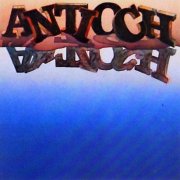 |
Antioch (1981, 41.52) */TT |
|
| I Will Thank You Lord I Can Feel Your Presence God So Loved the World Mary's Song Litany of Praise Love for You We Are Signs Speak to the Wind |
Worthy is the Lamb Kyrie Blessed Are They Holy Holy Holy Dying You Destroyed Lamb of God Maranatha |
|
Current availability:
Mellotron used:
Antioch took a slightly different approach to their Jesus rock, in the just-pre-CCM days of 1981, being essentially an accompanied church choir, multiple voices singing every song in massed unison or harmony to a largely acoustic backing. The same material with different lyrics and competent singers might at least vaguely approach acceptability, but this appalling, goddy sludge is more than flesh and blood can bear. Lowpoints? All of it, really, although the spoken-word sections in Blessed Are They and Dying You Destroyed are particularly awful. Incidentally, the five tracks on side two from Kyrie to Lamb Of God live under the umbrella of the 'Antioch Mass', although they're all separate pieces.
Dan Marcil plays Mellotron, with a cello line on Mary's Song, a string part (plus real flute) on Love For You, strings and (definitely Mellotronic) background choirs on Speak To The Wind and strings on Worthy Is The Lamb, the only thing that even remotely made this worth listening to. Quite horrible. Avoid.
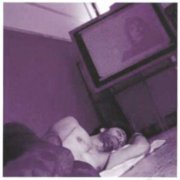 |
L'Estetica del Cane (2007, 44.16) ***/T |
|
| L'Estetica del Cane L'Artista Indipendente Canzone d'Amore per una Testa di Cazzo Se Tu Fossi una di Quelle Neanche un Elefante Approssimato per Eccesso Canto del Gioiello della Via di Mezzo Ho Smesso la Distro |
La Terra Insegue il Sole Chiocciolina Miliardi di Miliardi di Miliardi di Miliardi di Miliardi di Stelle Meditazione Risveglio |
|
Current availability:
Mellotron used:
Dario Antonetti is the man behind the startling Vegetable Man project, an attempt to release no fewer than a thousand (!) different versions of the legendary obscure Syd Barrett classic, finally officially made available on Pink Floyd's The Early Years 1965-1972. How far did they get? Six volumes, but top marks for effort. Antonetti's 2007 release, L'Estetica del Cane, might best be described as 'outsider art', quite in keeping with his obvious Syd fixation, mostly consisting of scrappily-played acoustic guitar accompanying Antonetti's on/off tuneful vocals. Any highlights? La Terra Insegue Il Sole's slide work makes it sound like a Meddle outtake, while Chiocciolina's keyboard work elevates it above the average. But what's going on with Meditazione? Is that a straight rip of the 'fly-swatting' section from the end of Ummagumma's Grantchester Meadows, or has he simply recreated it? Odd.
In the Labyrinth's Peter Lindahl plays his own Mellotron on one track, closer Risveglio, with atmospheric strings throughout and improvised flutes towards the end, to decent effect. The album was reissued, two years later, featuring three extra tracks, as Il Ritorno del Figlio dell'Estetica del Cane, but I don't believe there's any extra Mellotron. Irritatingly, although Antonetti has uploaded his back catalogue to YouTube, one of the three extra tracks is missing. Anyway, three stars for effort, but definitely an acquired taste.
See: In the Labyrinth
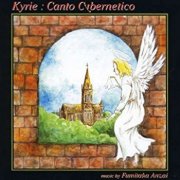 |
Kyrie: Canto Cybernetico (1999, 46.58) ***½/TTAsperges MeVidi Aquam Kyrie Eleison Gloria Credo Sanctus Agnus Dei Ave Maria Offertorium |
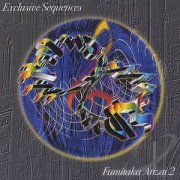 |
Exclusive Sequences (2001, 52.15) ***½/TT½ |
|
| Sad Sequence Prelude Part 1-2 Part 3 Interlude Part 4 Part 5 Epilogue Relax Your Mind (for New Mother and Baby) |
Sad Sequence: Interlude (chillout mix) Sad Sequence: Epilogue (healing mix) |
|
Current availability:
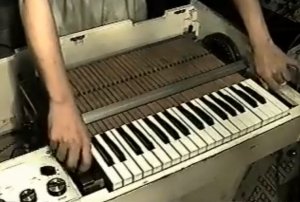 |
Mellotrons used:
Fumitaka Anzai is a Japanese composer, active since the early '80s, whose work has appeared on film scores and game soundtracks, amongst others. 1999's Kyrie: Canto Cybernetico is a strange, devotional music-inspired piece, combining segments of the Latin mass with elements of EM, trance, opera and pseudo-classical music, amongst other genres. Highlights? Probably opener Asperges Me, Agnus Dei and closer Offertorium, although that's coming from someone fairly allergic to the dancier end of things. Anzai's own M400 turns up on three tracks, with lush, chordal strings on Asperges Me, Credo and Offertorium, adding flutes to the last-named.
Two years on, Exclusive Sequences is more an electronic album made by someone from Anzai's background, as against the orthodox European one, the bulk of it one long, multi-part piece, Sad Sequence. It ranges from the 'standard' EM of Prelude, through the piano-led, ambient dance rock of Part 1-2, the vaguely Wakeman-esque piano of Part 4 and Epilogue's ambient synths, while Part 3 has something of Tubular Bells about it. Relax Your Mind (For New Mother And Baby)? Pretty much what it says on the tin. Not much more Mellotron than on Kyrie, with string parts on Sad Sequence Parts 1, 3 and 5, Relax Your Mind and the Chillout Mix of Sad Sequences's Interlude, which sounds like the part has been imported from another piece on the album.
 |
Anzen Band no Fushigi na Tabi (1976, 40.15) ***/THate no Nai TabiJikan no Uzu Yūhi no Naka e Yami no Fuchi Ohayō Another Time Baku Omatsuri Saikō Idainaru Kanōsei |
|
Current availability:
Mellotron used:
Discogs only list two Anzen Band albums, which may or not mean anything with regard to their career. The second of those, '76's Anzen Band no Fushigi na Tabi, sits at the lighter end of fusion, occasionally crossing over into a jazz/soul hybrid. It's possibly at its best on Another Time (the lone English-language title) and the more straightforward hard rock-lite of Baku, although an ill-advised venture into impeccably-played-yet-soulless blues, closer Idainaru Kanōsei, would've been better left on the cutting-room floor.
Mellotron from Satoshi Nakamura, with distant choirs on Yūhi No Naka E and upfront strings on Idainaru Kanōsei, although all other string parts are Solina-generated. Not the most exciting album on this site, frankly. Barely scrapes three stars.
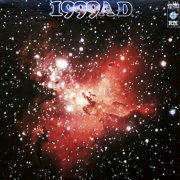 |
1999 A.D (1974, 35.56) ***/T½ |
|
| Opening I the Devil Destruction No. 1 Take That Happy Road Prayer Today's Love Destruction No. 2 My Sweet Funny Space |
Just Follow Me Peace of Mind The Whole World Knows |
|
Current availability:
Mellotron used:
Composer/arranger Nozomi Aoki's 1999 A.D is an English-language kind of prog/jazz concept album about the prophecies of Nostradamus, which is every bit as potty as you might expect. But is it any good? In places, is the short answer, notably on fusion jams Destruction Nos. 1 & 2, although the cheesy balladry of Today's Love and closer The Whole World Knows rather drag the album down.
Aoki plays uncredited Mellotron, with strings on Opening, choirs on Prayer and a string melody and chordal choirs on Peace Of Mind, none of it especially overt. I don't know if this has ever been issued on CD; no mention on Discogs, but that doesn't necessarily mean anything. To be brutally honest, it only just scrapes three stars, so without much Mellotronic input, I really wouldn't worry too much.
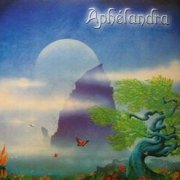 |
Aphélandra (2001, recorded 1976, 34.36) ****/T½AirsBelladonne Pat Aphélandra Corinthe |
Current availability:
Mellotron used:
Aphélandra's sole, eponymous album is one of those 'lost tapes' affairs, recorded in 1976, but not released until 2001. Unlike many similar, it's actually deserving of release, being a decent French symphonic progressive effort, with some excellent piano work from Philippe Grancher (who released a solo album the previous year, 3000 Miles Away). Actually, the more I listen to this, the more of a shame it seems that it wasn't released at the time, although then it would've been an utter obscurity ripe for a Musea reissue, rather than an unreleased utter obscurity that appeared twenty-five years after the event. Opener Airs, which would've taken up the whole of side one had this ever appeared on vinyl, is probably the album's best track, with notable interplay between Grancher's piano and guest Didier Lockwood's ripping violin. Clearlight's Cyrille Verdeaux also guests, although the band do a pretty good job on their own. The album's chief flaw is its stylistic inconsistency, with the title track being a bit of a waste of time, although there's enough good material here to make the whole worthwhile. There are (French-language) vocals, though most of the album's instrumental, so foreign-language phobics shouldn't have too much trouble.
The oddest thing about the record is Grancher's Mellotron use; he's credited with it, but it's difficult to work out exactly where it's used. Most of the album's massed vocal work appears to be real, although I think the choirs are Mellotronic (if not the usual eight voices) on Belladonne, Aphélandra itself and Corinthe, while the only obvious strings are a background part towards the end of Airs. This leaves the album's main use being the church organ in Pat, the tapes slipping authentically at one point, although there's nothing else obvious, accounting for the low T rating. Aphélandra's release is, generally speaking, a good thing and while it doesn't hang together quite as well as it might, it's worth hearing, though not for the Mellotron.
See: Philippe Grancher | Clearlight
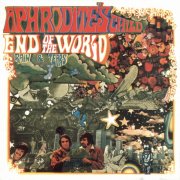 |
End of the World (1968, 35.13) ***½/TT½End of the WorldDon't Try to Catch a River Mister Thomas Rain and Tears The Grass is No Green Valley of Sadness You Always Stand in My Way The Shepherd and the Moon Day of the Fool |
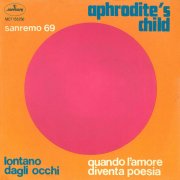 |
7" (1969) **½/T Quando l'Amore Diventa Poesia Lontano Dagli Occhi |
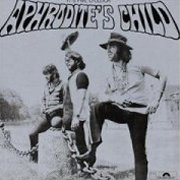 |
It's Five o'Clock (1969, 34.00) **½/TIt's Five o'ClockWake Up Take Your Time Anabella Let Me Love, Let Me Live Funky Mary Good Time So Fine Marie Jolie Such a Funny Night |
Current availability:
Mellotrons used:
Aphrodite's Child were, of course, the launching pad for both Demis Roussos and the rather more sublime Evangelos "Vangelis" Papathanassiou, who left Greece, heading for England, but were waylaid in Paris, where they recorded their debut, End of the World. It's a decent enough psych-pop album, if not quite the equal of the leading UK/US bands, spawning a huge hit across Europe with the rather limp Rain And Tears, which, it turns out, is based on Pachelbel's Canon in D Major. Highlights? Probably the bonkers The Grass Is No Green, The Shepherd And The Moon and Day Of The Fool, the latter stretching out into a creepy ethereal Hammond-fest, paving the way for the band's later progressive adventures. Now, a lot has been made of Vangelis' dislike of Mellotrons, consistently refusing to use one on his symphonic electronic late '70s albums (although I believe his additional live keyboard players were issued with them, interestingly). However, there's either a MkII or an early M300 are all over this album, highlights including You Always Stand In My Way, loaded with what sound like MkII strings and brass and the string-heavy (M300?) Day Of The Fool, plus what sounds like various Mellotronic woodwinds on Don't Try To Catch A River.
As a brief diversion, their popularity in Italy led the trio to record two songs by Italian composers, backing Quando L'Amore Diventa Poesia with Lontano Dagli Occhi, Mellotron strings on the 'A'. Their second album, It's Five o'Clock, starts off well enough, but, by its conclusion, shifts heavily into Zorba the Greek territory; it's hardly surprising old Demis ended up as he did. In comparison to the albums on either side of it, this is a bit of a dud, to be honest; a classic case of 'rushed follow-up syndrome'. The first couple of tracks are OK, but they seem unable to sustain the momentum and Vangelis also cuts back drastically on his Mellotron use. Background strings on the opening title track and more upfront flutes on Anabella are all you're going to get, so it's a resounding 'no' on all fronts. Of course, Aphrodite's Child reached their apogee on their last album, 1972's double 666, released after they'd split, but their debut, while hardly a meisterwerk of that level, is surprisingly good.
See: Demis Roussos
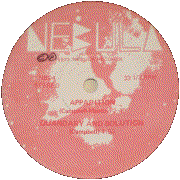 |
7" (1973) ***½/TTT½ Apparition Quandary & Solution Astral Spirit |
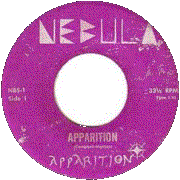 |
7" (1974) ***½/TTT½ Apparition Astral Spirit |
Current availability:
Mellotrons used:
Detroit native Scott Campbell was an important figure in that city's underground punk scene during the '70s, although he started off (in his teens) as more of a psych survivor. As far as I know, he released just two singles under the Apparition moniker, on his own, seminal Nebula imprint, 1973's Apparition EP and the same track the following year, albeit quite possibly a different, more professional version.
The '73 version opens with a low-fi, out of tune Mellotron string line, carrying on in a similar, no-budget style, Campbell playing all instruments himself; I can't help thinking that he should possibly have found himself a real drummer. The song? Decent enough psych, dated for the time, but, with forty years' hindsight, actually pretty damn' good, in its own way; an almost solo Mellotron flute part merely adds to its appeal. The second track, Quandary & Solution, is even more dated, not to mention Mellotron-free, but the flip, Astral Spirit, is practically a solo Mellotron piece, Arthur Sokoluk's heavily echoed vocals being the only other component, with flute, cello and chordal string parts all merging into a gentle, harmonious whole.
Assuming the other version of Apparition I've heard is the one to be found on the following year's 7", it's a slightly less low-fi take, the arrangement tightened up considerably, with better vocals, although purists might possibly say that what it gains in fidelity and professionalism, it loses in atmosphere and 'authenticity'. More of those Mellotron strings and flutes, anyway, making it well worth hearing for regular readers.
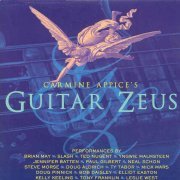 |
Guitar Zeus (1995, 57.57) ***/T |
|
| Dislocated (Paul Gilbert) This Time Around (Yngwie Malmsteen/Doug Pinnick) Safe (Neal Schon) 4 Miles High (Steve Morse/Jennifer Batten) So Long (Doug Aldrich) Nobody Knew (Black White House) (Brian May) Guitar Zeus Part 1 (Jennifer Batten) Killing Time (Ty Tabor) |
Where You Belong (Slash) Days Are Nights (Ted Nugent) Time to Set Alarms (Elliot Easton/Bob Daisley) Under the Moon & Sun (Mick Mars) Guitar Zeus Part 2 (Leslie West) |
|
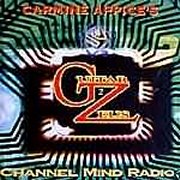 |
Guitar Zeus 2 (1997, 63.46) **½/½ |
|
| Stash (Stevie Salas) Code 19 (Zakk Wylde) Perfect Day (Warren DeMartini) Gonna Rain (Richie Sambora) Gavotte in E Major (Stuart Smith) The Score (Ted Nugent) Out of Mind (Neal Schon) Guitar Zoo (C.C. Deville) |
Nothin' (John Norum) Trippin' Again (Ty Tabor) Dead Wrong (Dweezil Zappa) Doing Fine (Vivian Campbell) My Own Advice (Kenji Kitajima) |
|
Current availability:
Mellotrons used:
Carmine Appice's been around seemingly forever, co-founding Vanilla Fudge in the mid-'60s and going on to form Cactus and Beck, Bogert & Appice, also playing with Rod Stewart, Ozzy Osbourne and a host of others. Presumably finding himself at a loose end in the '90s, post- the execrable King Kobra, he struck on the idea of the Guitar Zeus series, sticking a string of name players onto a consistent rhythm section, making the resulting albums a far more cohesive proposition than most various artists efforts. After the initial '95 release, '97 brought the follow-up, followed by Guitar Zeus Japan and (wait for it) Guitar Zeus Korea. Um, Korea? The same Korea that's produced a glut of world-class guitarists? That Korea? I'm sure ol' Carmine has his reasons, but I can't imagine this one doing too well internationally. Speaking of which, the latest entries in the series are Guitar Zeus International and (gulp), a partial compilation, Ultimate Guitar Zeus, at which point he's hopefully (please?) realised that he's milked the franchise dry.
The original Guitar Zeus is good enough at what it does, I suppose, although an hour of rather uninspired hard rock is about forty-five minutes more than I can stand, generally speaking. Doug Pinnick and Ty Tabor from the criminally-underrated King's X both guest, Pinnick adding his distinctive vocals to a couple of tracks, although regular series vocalist Kelly Keeling doesn't half sound like him in places. The rest of the guest stars sound more or (mostly) less distinctive, the 'more' category being inhabited chiefly by Tabor and Ted Nugent, the one player whose style really stands out here, amazingly. Even Brian May's usually distinctive tone fails to cut through on his contribution, while most of the rest sound pretty much like each other, not least the wildly overrated Slash. Keeling and bassist Tony Franklin add Mellotron to a couple of tracks, with flutes on the gentle chorus of Safe and a handful of volume-pedalled string chords on Killing Time, barely gleaning the album a whole T.
Guitar Zeus 2 is, essentially, more of the same. You expected anything else? Something I'll say in these albums' favour is that unrestrained shredding has largely been kept in check, even amongst the participating exponents, which has to be a bonus. Unfortunately, none of the album's material seems to be in any way memorable and the guitarists are almost all entirely interchangeable. As for some of the choices... Members of both Ratt and Poison? Are you sure? Ten years after their respective heydays? Even ol' Ted's contribution is less iconic this time round. Basically, the law of diminishing returns has kicked in; one such album is a novelty: more is actually less. Only one obvious Mellotron track (from Keeling) this time round, with 'Strawberry Fields' flutes on Perfect Day [note: sound reasonably authentic, but prob.aren't], so you're even less likely to want this one than its predecessor on the Mellotron front, I'd wager.
See: Beck, Bogert & Appice | Ozzy Osbourne | Journey | Leslie West | Stevie Salas Colorcode | Black Label Society
 |
Tidal (1996, 51.38) ***/TTTT½ |
|
| Sleep to Dream Sullen Girl Shadowboxer Criminal Slow Like Honey The First Taste Never is a Promise The Child is Gone |
Pale September Carrion |
|
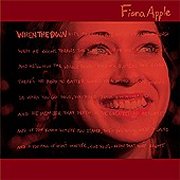 |
When the Pawn (1999, 43.01) ***/TTT |
|
| On the Bound To Your Love Limp Love Ridden Paper Bag A Mistake Fast as You Can The Way Things Are |
Get Gone I Know |
|
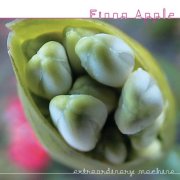 |
Extraordinary Machine (2005, 50.34) ***/TT |
|
| Extraordinary Machine Get Him Back O' Sailor Better Version of Me Tymps (the Sick in the Head Song) Parting Gift Window Oh Well |
Please, Please, Please Red, Red, Red Not About Love Waltz (Better Than Fine) |
|
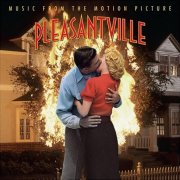 |
Pleasantville (1998, 9.08) ***/T½[Fiona Apple contributes]Across the Universe Please Send Me Someone to Love |
Current availability:
Chamberlins/Mellotron used:
Fiona Apple is one of those Lilith Fair types, like a more acoustic version of Alanis Morissette, albeit with even less dulcet tones (?!), aiming fairly and squarely at a female audience. You know, "Sometimes it's hard to be a woman"; er, didn't somebody else write that? She's far from prolific, but I suppose there are advantages to not flooding the market with substandard work.
I can't really say I'm into this stuff very much, to be honest, but there's shitloads of Patrick Warren and Jon Brion (the usual suspects again)'s Chamberlin to be heard, particularly on Tidal. Unsurprisingly, more strings than anything else, though I'm sure I caught some brass on Sleep To Dream, plus cellos all over the place. Actually, this is something of a classic Chamberlin album, whatever I might think of the music. Particular highlights are The Child Is Gone and Carrion, but with Chamby on all but one track, it's practically a demonstration record for the instrument.
Ms Apple's second album sports the unfeasibly lengthy and pretentious title When the Pawn Hits the Conflicts He Thinks Like a King What He Knows Throws the Blows When He Goes to the Fight and He'll Win the Whole Thing 'Fore He Enters the Ring There's No Body to Batter When Your Mind is Your Might So When You Go Solo, You Hold Your Own Hand and Remember That Depth is the Greatest of Heights and if You Know Where You Stand, Then You Know Where to Land and if You Fall it Won't Matter, 'Cuz You'll Know That You're Right (Guinness Book of Records, anyone?), commonly (and unsurprisingly) known as When the Pawn. Patrick Warren is credited with Chamberlin on four tracks, but producer Jon Brion presumably plays one on opener On The Bound, too. Warren's use is as good as on Tidal; it's just a shame it's not on more tracks; again, mostly strings, but there may be bits of cello and brass in there, too. Like Never Is A Promise from Tidal, several tracks have real strings on them, so maybe she's heading more in that general direction, which would be a bit of a pity, as what tape replay there is here is excellent.
Fiona's third album has a rather tumultuous history; originally produced by Brion again, work dragged on and tracks were leaked, although the (supposedly) finished article never appeared (for what it's worth, it has no obvious tape-replay input). Recording began again with a different production team, including The Moog Cookbook's Brian Kehew, the eventual result, Extraordinary Machine, finally appearing in 2005, removing the original album's best track, Used To Love Him. Genius. Musically, the released version is fairly typical Apple; offbeat, quirky singer-songwriter stuff with vaudeville influences. Co-producer Mike Elizondo plays Mellotron, with Jebin Bruni and Zac Rae (more usual suspects, then) on Chamberlins, with upfront flutes on O' Sailor, background ones on Better Version Of Me and very obvious strings on Tymps (The Sick In The Head Song) and Red Red Red. It's perfectly possible that it's on other tracks, but, as so often with the instrument, it's hard to tell it apart from actual orchestral instruments, proving that old Harry Chamberlin was right all along.
See: Samples etc. | Pleasantville
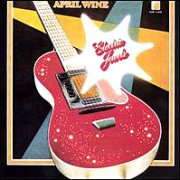 |
Electric Jewels (1973, 38.01) ***½/½Weeping WidowJust Like That Electric Jewels You Opened Up My Eyes Come on Along Lady Run, Lady Hide I Can Hear You Callin' Cat's Claw The Band Has Just Begun |
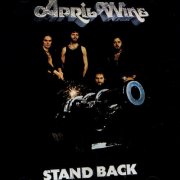 |
Stand Back (1975, 38.36) ***/½ |
|
| Oowatanite Don't Push Me Around Cum Hear the Band Slow Poke Victim for Your Love Baby Done Got Some Soul I Wouldn't Want to Lose Your Love Highway Hard Run |
Not for You, Not for Rock & Roll Wouldn't Want Your Love (Any Other Way) Tonite is a Wonderful Time to Fall in Love |
|
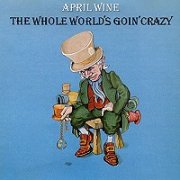 |
The Whole World's Goin' Crazy (1976, 34.51) ***/T |
|
| Gimme Love Child's Garden Rock'n'Roll Woman Wings of Love Marjorie So Bad Shotdown Like a Lover, Like a Song |
Kick Willy Rd. The Whole World's Goin' Crazy |
|
Current availability:
Mellotron used:
Amazingly, for a band who only picked up any sort of recognition outside Canada with 1979's Harder, Faster, '73's Electric Jewels was April Wine's third album, although they had originally formed as far back as 1969. It completely belies their early reputation as a not-very-hard rock band, notable for filling their albums with, er, filler; most of the album's material is typical early-'70s hard rock, opening with the excellent Weeping Widow, with its deceptively quiet first few bars and the boogie of Just Like That. There are some quieter numbers; You Opened My Eyes and the (real) strings-driven Lady Run, Lady Hide are pretty drippy, but most of the album sticks to their new, rockin' template. Vocalist/guitarist Myles Goodwyn adds Mellotron to one track, with some nice string surges in Electric Jewels itself, although while the strings at the beginning of Lady Run, Lady Hide sound real, or at least, un-Mellotronic, they sound more Mellotronlike towards the end of the track. Could this be another example of those surprisingly realistic M300 strings?
Their follow-up, '75's Stand Back, is in a similar vein, if less punchy, kicking off with one of their best tracks, Oowatanite (still a set regular into the '80s), other better tracks including Victim For Your Love and Highway Hard Run, but it's all a bit run-of-the-mill, I'm afraid. Goodwyn plays Mellotron strings under the guitar solo on big ballad I Wouldn't Want To Lose Your Love and a handful of background string chords on Wouldn't Want Your Love (Any Other Way), although the strings on Cum Hear The Band sound real.
By 1976's The Whole World's Goin' Crazy their lineup only contained one original member and their early reputation had clearly returned to haunt them. To be blunt, going by this album, you can see why it took them so long to break out of their home country, although it was available abroad (there's definitely a UK version). It's... boring. OK, that's probably a little harsh, but it's completely run-of-the-mill US-style hard rock of the period, with nothing to really differentiate it from a thousand other bands; in fact, they did pretty well in the long run, all things considered. It starts OK, although Gimme Love is never going to be on anyone's list of all-time favourites (is it?), while Wings Of Love isn't bad, but tracks like the clichéd Rock'n'Roll Woman, or the tedious rock'n'roll of the title track, complete with 'helium' backing vocals are just plain bad. The album's sole Mellotron track is the balladic Like A Lover, Like A Song, with much of the track's instrumentation (all the piano and Mellotron) provided by 'Serge Locas', obviously Serge Locat of Harmonium, another Montreal-based band (although April Wine actually originally hailed from the unlikely environs of Halifax, Nova Scotia). It's a pretty typical mid-'70s piano ballad, to be honest, although Locat's initially background Mellotron strings rise up to the front of the mix towards the end of the song.
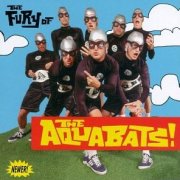 |
The Fury of the Aquabats! (1997, 51.19) ***/T½ |
|
| Super Rad! Red Sweater! Magic Chicken! Fight Song! Cat With 2 Heads! Story of Nothing! Captain Hampton and the Midget Pirates! Martian Girl! |
Attacked By Snakes! Idiot Box! Powdered Milk Man! My Skateboard! Phantasma del Mar! Lobster Bucket! Theme Song! Playdough Revisited! |
|
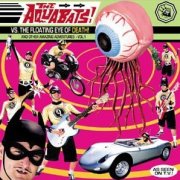 |
The Aquabats vs the Floating Eye of Death! (1999, 46.14) ***/T½ |
|
| Sequence Erase! Giant Robot-Birdhead! Anti-Matter! Lotto Fever! Lovers of Loving Love! Chemical Bomb! The Man With Glooey Hands! Monsters Wedding! |
The Ballad Of Mr. Bonkers! Canis Lupus! Tiny Pants! The Thing on the Bass Amp! Amino Man! Hello, Good Night! |
|
Current availability:
Mellotrons used:
The Aquabats (or Aquabats!) are a California-based ska band with a natty line in matching superhero costumes, all tying in with their constantly evolving formation mythos. Actually, they look like they're a lot of fun live, with members taking on nom de plumes and choreographed battles with their legion of enemies, not least Powdered Milk Man and the Floating Eye of Death. Ridiculous? Yup, but why not? Compared to the legions of overly-earnest indie twats, The Aquabats! are a breath of fresh air, albeit not the most profound band you'll ever encounter. Like they'd care.
1997's The Fury of the Aquabats! is their second effort and if I may lay a criticism at its door, it's that it's too long; this kind of stuff (like punk) works best in short bursts, so fifty minutes at once is a bit of an ordeal. It's also a bit single-dimensional musically, but then, it's ska - not exactly a style known for its innovation or variety, right? This is music written to be played live, in the proverbial sweaty club, so, all things considered, it comes across pretty well on one of those shiny little discs. I'm not sure if it's actually possible to nominate a 'best track', but Captain Hampton And The Midget Pirates! made me chuckle, which isn't a bad thing on a grey Wednesday morning. Mellotron from two players, Charles Wallace Gray (a.k.a. Ultra Kyu, a.k.a. The Mysterious Kyu) and James Randall Briggs (a.k.a. Jaime the Robot, a.k.a. The Robot, a.k.a. Jimmy the Robot), with choirs on Cat With 2 Heads! and Playdough Revisited!, backing up the band's own b/vs and a string part on Attacked By Snakes! It all sounds reasonably authentic, though who knows?
Two years on and The Aquabats vs the Floating Eye of Death! (technically The Aquabats vs the Floating Eye of Death! and Other Amazing Adventures, Vol. 1), while still ska-influenced, has moved the goalposts to include new wave-style textures, with more straightforward rhythms and an increased reliance on synths. Somehow, this is slightly less appealing than its predecessor, although the lyrics are every bit as silly; maybe they NEED the ska? Anyway, no idea who plays the Mellotron this time round, but apart from the probably-not flutes on Monsters Wedding!, the only obvious parts are the choirs on The Thing on the Bass Amp! and the full-on attack of cellos, strings and clicky flutes on closer Hello, Good Night!
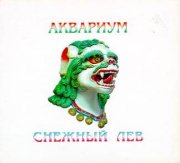 |
Snow Lion (1996, 38.37) ***/T |
|
| Serebrjanaja Roza Centr Ciklona Maksim-Lesnik Drevnerusskaja Toska Dubrovskij Incident v Nastas'ino Istrebitel' |
Chernyj Brahman Velikaja Zheleznodorozhnaja Simfonija |
|
Current availability:
Mellotron used:
Led by the legendary Boris Grebenshikov, Aquarium/Аквариум have released a slew of albums from the very early '80s up to the present day. 1996's Snow Lion/Снежный Лев is, apparently, one of his/their 'Russian period' releases, a folk-rock album that combines Russian and Celtic influences with rock'n'roll and a dozen other disparate styles. Eclectic? Yup. Highlights? Celtic opener Serebrjanaja Roza/Серебряная Роза, Dubrovskij/Дубровский and Chernyj Brahman/Черный Брахман; the slower stuff, basically.
Pavel tells me that the Google translation of one site reads something like, "...We were back in London. A Mellotron (it's the same thing that plays at the beginning of 'Zheleznodorozhnaja Symphony') was waiting for us in the studio ever since the 'Navigator'." [Note: their previous, seemingly Mellotron-free release]. Now, it seems that their studio was just down the road from where I lived at the time and I did hire my machine out once that year, but this definitely isn't that session (it was for a dance version of Buffalo Springfield's For What It's Worth, bizarrely). A studio machine? A hired-in one? Who knows? Anyway, we get background choirs on Istrebitel'/Истребитель and, as the man says, flutes all over Velikaja Zheleznodorozhnaja Simfonija/Великая Железнодорожная Симфония, in fairly pleasing style. Will you buy this album for it, though? Of course not, but if a Celtic/Russian stew sounds like your bag, you may wish to hear it for that.
See: Samples etc. | Boris Grebenshikov
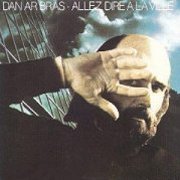 |
Allez Dire à la Ville (1978, 43.05) ***/TT |
|
| Allez Dire à la Ville Suite Ecossaise L'Amour Kerne Les Oiseaux et les Electrons de Brenilis Dimanche Apres-Midi Toi Fils de Roi Fils de Rien (Tu Lis Ton Ascendance) Farewell Bob Brown Requiem pour le Jet |
Les Saisons L'Amour le Nucleaire et le Crepuscule Plainte de Yann Vari Perrot |
|
Current availability:
Chamberlin used:
Breton Dan Ar Bras (born Le Bras, later Ar Braz) started his career in Alan Stivell's band, going on to solo success, culminating in the 1990s, with his vast group of Celtic musicians (including Stivell), L'Héritage des Celtes. Allez Dire à la Ville was his fourth solo album, following a brief (and unrecorded) stint in a struggling Fairport Convention in 1976 and is probably best described as mainstream Celtic folk/rock, not a million miles away from what Scotland's Runrig would do a decade later. As a result, traditional tunes such as Farewell Bob Brown and Suite Ecossaise, enhanced by Ar Bras' electric guitar, rub shoulders with acoustic balladry (Les Saisons) and straightforward rock tunes (Requiem Pour Le Jet and the title track), which haven't aged well, but probably helped to sell the record at the time.
Unusually for a European album, Allez Dire à la Ville features a Chamberlin (quite certainly the same one that graces Magma's Attahk, recorded the same year), played variously by Magma's Benoît Widemann and Patrick Audoin. Three credited tracks, with a clear, orchestral-style string part in L'Amour Kerne and subtler parts in Toi Fils De Roi Fils De Rien (Tu Lis Ton Ascendance) and Plainte De Yann Vari Perrot, all of which sound like they could easily have been played by real strings; maybe they couldn't afford them? As an entrée to Ar Bras' work, I wouldn't have thought Allez Dire à la Ville was your first port of call, although having not actually heard any of his other work, I couldn't say what would be. It's not a bad album as such, just a little bitty and dated in places, with the synth in, say, L'Amour Le Nucleaire Et Le Crepuscule sounding rather out of context next to its folkier tracks.
See: Alan Stivell
 |
The Red Thread (2001, 57.07) **½/T½ |
|
| Amor Veneris Last Orders Scenery Devil Tips Long Sea Love Detective Infrared Screaming in the Trees |
Haunt Me Turbulence |
|
Current availability:
Mellotron used:
The Arab Strap named themselves after an obscure sex aid; so obscure, in fact, that I have absolutely no idea what it is. The mind boggles. [n.b. Just found it on Wikipedia. Lovely.] Anyway, the Scots duo had an early Belle & Sebastian connection, although the bands fell out over the latter's The Boy With the Arab Strap album. There is, in fact, some considerable similarity between the two outfits' styles, both playing quiet indie, although The Arab Strap's version is more electronic than the fey Belles' one. 2001's The Red Thread is their fourth album (of six; they split in 2006), but, I think it's fair to say, you've really got to be into this stuff to get it; a couple of tracks were OK, but it quickly irritated the fuck out of me. Sorry, chaps.
With no actual credited Mellotron, conjecture is rife over what the band actually used. Somebody (probably multi-instrumentalist Malcolm Middleton) plays Mellotron-sounding strings on Screaming In The Trees and cellos and strings on Haunt Me, confusingly combined with real strings on both tracks. I think, until/if I should find out otherwise, I think I'm going to have to leave this here, good people. I wouldn't really go too far out of your way for this; UK indie fans probably already own a copy and the rest of you are unlikely to go ape over it, so without enough Mellotron to make it worth the effort, I'll have to say: don't.
See: Malcolm Middleton
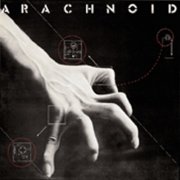 |
Arachnoid (1979, 46.09) ***½/T½Le ChamadèrePiano Caveau In the Screen Side of Your Eyes Toutes ces Images La Guêpe L'adieu au Pierrot Final |
Current availability:
Mellotron used:
Interesting one, this. Arachnoid are quite difficult to categorise on their sole, eponymous 1979 release, to be honest; a bit Genesis, a lot Crimson, definitely some Ange, maybe a bit jazzy... French-language vocals, but less 'harsh' than Ange, with two keyboard players. All the material's good (including the CD's bonus tracks), but cream of the crop has to be thirteen-minute opener Le Chamadère; runner-up: Toutes Ces Images.
I can hear Mellotron on four of the album's tracks, although François Faugieres also plays 'modified Farfisa organ', so like Ange, what sounds like Mellotron may not be and vice versa... Definite parts include some volume-pedalled strings halfway through Le Chamadère, repeating towards the end of the track, occasional strings on In The Screen Side Of Your Eyes, occasional strings and choirs on Toutes Ces Images and more volume-pedalled strings on La Guêpe, various string parts sometimes combined with the Farfisa. Given that Philippe Besombes engineered, there's a good chance they used his M400. All in all, a thoroughly decent effort; low-budget, but good material and great playing. Once again, well done Musea.
 |
The Suburbs (2010, 63.57) **½/T |
|
| The Suburbs Ready to Start Modern Man Rococo Empty Room City With No Children Half Light I Half Light II (No Celebration) |
Suburban War Month of May Wasted Hours Deep Blue We Used to Wait Sprawl I (Flatland) Sprawl II (Mountains Beyond Mountains) The Suburbs (Continued) |
|
 |
Reflektor (2013, 69.30) *½/½ |
|
| Reflektor We Exist Flashbulb Eyes Here Comes the Night Time Normal Person You Already Know Joan of Arc Here Comes the Night Time II |
Awful Sound (Oh Eurydice) It's Never Over (Hey Orpheus) Porno Afterlife Supersymmetry |
|
Current availability:
Mellotrons used:
Could somebody please explain to me just what, exactly, is supposed to be so wonderful about The Arcade Fire? They seem to personify North American indie with their rhythmically boring, lifeless songs; yeah, yeah, don't tell me: listen to the lyrics, right? Trouble is, I don't care. What about the music? What about the music, eh? Who cares about the fucking lyrics? What's the point in fantastic lyrics (all assuming they are) if the music's as dull as shite? Er... Their third album, The Suburbs, is essentially a concept piece about precisely that, although I'm of the opinion that fellow Canucks Rush covered the subject more than adequately in one song, Subdivisions (from 1982's Signals), but then I would, wouldn't I? Maybe I simply shouldn't bother reviewing music that other people love and I don't, eh? Pointless, really.
The Arcade Fire bought one of the first M4000 Mellotrons to roll off the production line (such as it is), members of the band allegedly using it on a track or two on the soundtrack to 2009's The Box; more news when/if the soundtrack's actually released. As far as The Suburbs is concerned, it's pretty difficult to tell where it might be for various reasons, not least the presence of real strings on much of the album and the twenty-four sounds available on the machine, making it just as likely that a band will use, say, oboes or bass clarinet as 'regular' strings, flutes or choirs. What we seem to get are an obvious string part on Half Light II (No Celebration) and strings and (eight voice) choir on Sprawl II (Mountains Beyond Mountains), as far as I can ascertain. In fairness, any one track from this played in isolation isn't too bad, but the cumulative effect of over an hour of the stuff is enough to drive non-indie fans to fury. Good at what it does (he said, grudgingly), but little obvious Mellotron.
And a three-year wait brings... Reflektor, an appalling, shonky mess of an album. In an odd kind of way, I'm reminded of Oasis' truly terrible Be Here Now, not stylistically, but in its lack of restraint and the band's arrogant 'too big to edit' mindset. Like that trainwreck, most of its tracks outstay their welcome by two or three minutes, while we're also treated to some terrible playing, in true indie style. And those much-vaunted lyrics? There seems to be a classical theme going on here (see: crummy sleeve design), with references to Eurydice and Orpheus, but Joan Of Arc? No-one's ever written songs about her before, have they? As far as that expensive M4000's concerned, I wouldn't be at all surprised to find that it isn't here at all, although it sounds like pitchbent strings at the end of Here Comes The Night Time. Pitchfork rated this as one of their '100 Best Albums of the Decade So Far'. What are they hearing that I'm not? Well, it is Pitchfork, I suppose... For what it's worth, there's nothing obvious on 2017's Everything Now (**), but I still had to listen to it. Tell me, how is this, qualitatively, really any different to Coldplay?